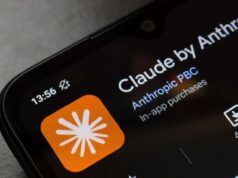
Imagine your web browser, the gateway to everything online, powered by the artificial intelligence behind ChatGPT. It sounds like a futuristic concept, maybe even a distant Silicon Valley daydream. But recent developments in a high-stakes courtroom battle suggest this possibility, once unthinkable, might not be so far-fetched after all.
The dramatic twist unfolded this week during the remedies phase of the U.S. Department of Justice’s landmark antitrust trial against Google. The core of the case? Allegations that Google illegally maintains a monopoly in the online search market through anti-competitive practices. Having already ruled that Google holds a monopoly, the court is now exploring potential remedies to restore competition. One radical proposal from the DOJ is forcing Google to sell off its incredibly popular Chrome browser.
Enter OpenAI, the company that rocketed to global prominence with its generative AI model, ChatGPT. Testifying on behalf of the government on Wednesday, April 23, OpenAI’s Head of Product for ChatGPT, Nick Turley, delivered a statement that sent ripples through the tech world: If the court mandates Google to divest Chrome, OpenAI would be interested in buying it.
Turley’s testimony wasn’t just a casual expression of interest. It highlighted OpenAI’s strategic thinking and its vision for integrating powerful AI directly into the tools people use every day. He explained that a deep integration of ChatGPT within a browser like Chrome could create what he called a truly “AI-first” Browse experience. Think of a browser that doesn’t just display information but actively helps you understand, summarize, and interact with web content in entirely new ways, driven by conversational AI.
For OpenAI, acquiring a platform like Chrome represents a massive opportunity to overcome one of its significant challenges: distribution. While ChatGPT has gained immense popularity, getting its technology seamlessly integrated into major user interfaces controlled by tech giants has been difficult. Turley noted the success of integrating ChatGPT into Apple’s iPhone but highlighted the hurdles faced with Android manufacturers, where Google’s influence and agreements play a dominant role. Owning Chrome, with its billions of users worldwide (reportedly holding around 64% of the desktop browser market share as of March 2025, according to data cited in reports), would instantly provide OpenAI with a direct, massive distribution channel for its AI technologies.
Turley also shed light on past interactions, revealing that OpenAI had approached Google last year about a potential partnership to leverage Google’s search technology within ChatGPT. According to Turley’s testimony, Google declined the offer, citing concerns about involving too many competitors. This history underscores OpenAI’s motivation to potentially control its own distribution platform if the opportunity arises.
Google, for its part, maintains a firm stance. The company argues strenuously against the DOJ’s proposal to break up its business, including forcing a Chrome sale. Google contends that such measures would harm consumers by degrading the quality and performance of products people rely on daily. They have repeatedly stated that Chrome is not for sale and plan to appeal the court’s earlier monopoly ruling. Lee-Anne Mulholland, Google’s head of regulatory affairs, was quoted stating that the DOJ’s proposals “would hurt America’s consumers, economy, and technological leadership.”
The very idea of Chrome, a cornerstone of Google’s empire and the most widely used browser globally, being sold off feels momentous. Analysts have speculated on the potential price tag, with some estimates placing Chrome’s value at $15 billion or more – a staggering figure, but one that reflects its strategic importance as a gateway to the internet.
While OpenAI’s expression of interest adds a fascinating new layer to the antitrust drama, it’s crucial to remember that a potential sale of Chrome is not a done deal. It is a remedy proposed by the DOJ, and the final decision rests with Judge Amit Mehta, who is presiding over the trial. His ruling on remedies is expected by August 2025. Even if the judge were to order a divestiture, the process would be incredibly complex, likely facing lengthy appeals and significant regulatory hurdles.
Furthermore, OpenAI would not be the only potential suitor if Chrome were suddenly on the market. Given its strategic value, many other technology companies would undoubtedly express interest.
The testimony from OpenAI’s executive opens a window into the potential restructuring of the digital landscape driven by both regulatory pressure and the rapid advancements in artificial intelligence. The possibility, however conditional, of a browser controlled by an AI-first company like OpenAI highlights a future where the tools we use to navigate the web could become far more intelligent and integrated with AI capabilities.
Ultimately, the fate of Google Chrome and the potential for OpenAI (or another entity) to acquire it hangs on the outcome of this pivotal antitrust trial. The courtroom discussions reveal the immense value placed on controlling the user’s online entry point and the intense competition heating up at the intersection of search, browsers, and artificial intelligence. The next few months, leading up to the judge’s decision, will be critical in determining whether this courtroom bombshell leads to a seismic shift in the tech world.










